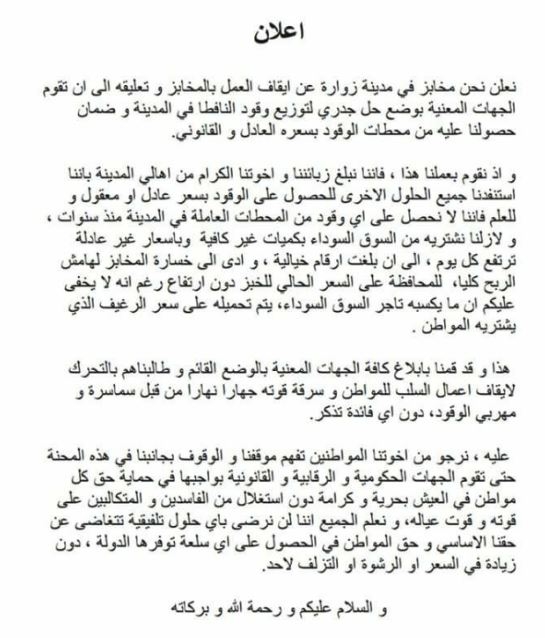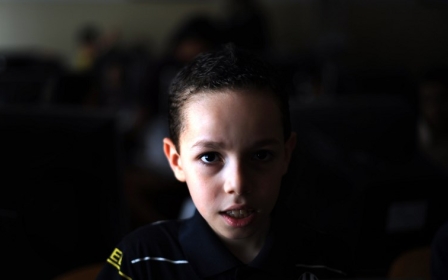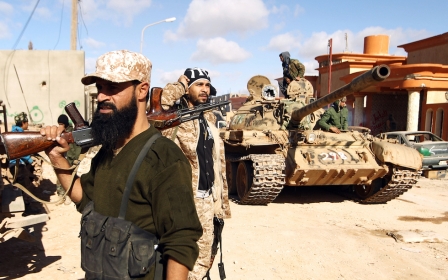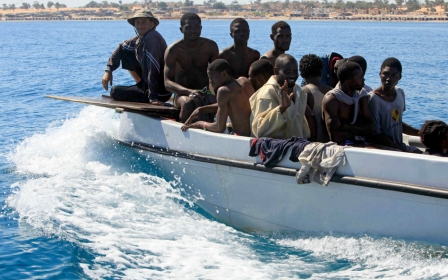Bread makers go on strike in Libyan city as fuel crisis grows
A coalition of bread bakers in the Libyan city of Zuwarah has gone on strike in protest at the fuel crisis the city is facing.
Zuwarah has been struggling with a fuel crisis for many months now, as the city has been targeted by fuel smugglers.
Petrol station owners receive tokens, in order to get petrol and diesel from distributors affiliated to the Ministry of Economy, however, many have been selling their tokens to smugglers operating on the black market, at highly inflated prices.
The pump price of petrol in Libya before the 2011 revolution was between 0.200 and 0.220 LD per litre ($0.15-$0.16). However today, at the pump, the price is around 0.300 LD per litre.
Residents would be happy to buy fuel at this price, a baker involved in the strike told MEE, however in Zuwarah, petrol has not been readily available in petrol stations for nearly two years.
"We haven't been successful in accessing any fuel from public petrol stations in the city for years," the statement reads.
The use of the black market to buy fuel has become increasingly necessary in Zuwarah, as otherwise families would struggle to get around, and businesses, many of which rely on fuel-generated power generators during extensive power cuts, would be unable to function.
"We are still having to buy it on the black market in quantities that are insufficient for us, and prices that are unfair and rising everyday," the statement continues.
The strike, according to the statement, will continue until the "relevant parties" are able to provide a solution to the crisis.
Illegal fuel trade
Zuwarah is 60km from the Libyan-Tunisian border crossing of Ra's Ajdir, a hotbed for smugglers who take fuel over the border and sell it in Tunisia at a higher price. Communities on either side of the border have become dependent on the trade, as inflation in Libya reaches record highs.
In January, the chairman of the National Oil Corporation of Libya (NOC), Mustafa Sanalla, condemned the fuel smuggling and the effect it is having on civilians in the country.
Sanalla also revealed that smuggling gangs have been stealing the fuel allocated by distribution companies before it even reaches the petrol stations, which is what has been happening in this case.
The Ministry of Economy authorises distributors to give out the fuel once it has been provided to them by the Brega Petroleum Marketing Company, controlled by the NOC.Once the distributors receive the fuel from the Brega Petroleum Marketing Company, controlled by the NOC, they are then responsible for providing it to licensed petrol stations.
Smugglers in and around Zuwarah have been stealing the fuel directly from the distributors, using the tokens sold to them by petrol station owners.
Fuel smuggling is "the most lucrative illicit trade between Tunisia and Libya" according to Libya analyst Viraj Pattni.
Response from residents
While the local residents are the ones most affected by this rise in petrol prices, many have condemned the bakery strike.
Nasser, a resident of Zuwarah, told MEE he did not believe it would achieve its aims.
Speaking to MEE, he said: "This won't work. They have done this before, when the cost of flour was way too high; they closed the bakeries."
Last year, the city experienced a flour crisis, prompting the bakeries to shut down in a similar strike.
Flour prices form the factories had reached record highs, and the strike lasted almost a week before flour prices were brought back down.
But despite flour prices being lowered, bread prices, which have quadrupled in recent years, remained inflated.
"When the price of flour was reduced again, the inflated bread prices just remained high. They are all exploiting us - the residents - with no interest in our well-being."
Smugglers in Zuwarah range from young amateurs hoping to make some extra money, to organised crime groups operating internationally with the port of Zuwarah now completely in control of the armed militias.
Some of these black market traders have begun storing fuel at home, in large domestic water tanks, normally positioned on roof tops, and not fit for fuel storage, leading to the outbreak of several fires in densely populated areas.
Ant-smuggling measures were discussed in mid-January by the NOC and BPMC. Unannounced visits to fuel stations have taken place, residents say, and many fuel stations merely existing on paper have been discovered.
New MEE newsletter: Jerusalem Dispatch
Sign up to get the latest insights and analysis on Israel-Palestine, alongside Turkey Unpacked and other MEE newsletters
Middle East Eye delivers independent and unrivalled coverage and analysis of the Middle East, North Africa and beyond. To learn more about republishing this content and the associated fees, please fill out this form. More about MEE can be found here.





